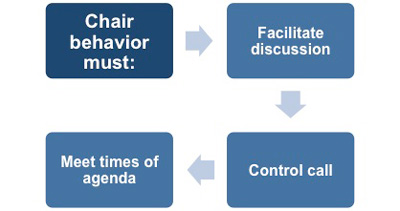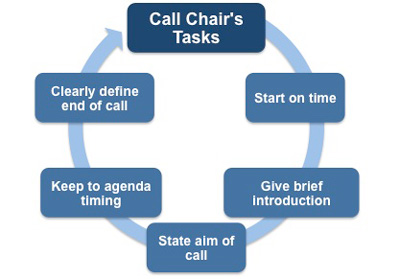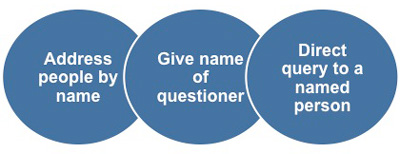Controlling a Conference Call
Having laid a solid foundation for your call through careful preparation, your task now is to facilitate the call discussions to achieve your objective. Usually the person requesting the call performs the role of chair or facilitator to ensure the call is successful. When you are the requester you will need to ensure your behaviors portray the necessary characteristics of this role.
 |
As Chair you will need to be assertive to maintain control of the call and use the agenda to manage the nature and length of discussion for each topic. By keeping control of the call's focus you will ensure clarity is maintained during conversations, also confusion is avoided by you regularly summing up what has been agreed as discussions progress.
It is essential that during the call you politely but firmly guide people back onto topic if the digress or wander off topic. You also need to make sure everyone has a fair opportunity to contribute and if you've not heard someone speak for a while try to draw them into the conversation because you know from your preparation that all participants have a valuable contribution to make.
Your expertise as a facilitator and chair will have a profound effect on the outcome of you conference call. There are several tasks you have to perform to ensure your call is a success.
• Start on Time
• Brief Introduction.
• State the Call Objective
• Stick to the Agenda timings
• Definite end to call
The first task is to start the call at the scheduled time and not to wait for latecomers. If you delay waiting for one or two people you risk having your call high-jacked by another participant. Once this has happened it is an uphill struggle to regain control of the call and focus the conversation on your objective.
 |
Your behavior needs to demonstrate that when you say your call starts at 10am it really does. Those who come into the call late will be conscious of their failure to act professionally and make sure they are on the call from the start in the future as no one wants to look amateurish in front of their colleagues and customers.
Quickly recap who is involved in the call so that others can refer to your pre-meeting information for any further details they require. Then you will clearly state why you have requested the call and its objective. Explain how you want conversations to be conducted e.g. callers to identify themselves before they speak and the timings for each topic as outlined in your agenda.
At the start of each agenda item you can ask who wishes to contribute so that you have a list of speakers. This gets around the lack of visual signs people can give the chair when they wish to speak in meetings whilst also providing you with a record of who has spoken and who has yet to contribute. This offers you the opportunity to encourage quieter participants to contribute. You can achieve this by asking a question or you can ask for their opinion on the subject being discussed.
Your control of the call is maintained through the medium of your agenda and you will need to strictly enforce the timings you have selected. This is especially important when you wish to close the call, as the end must be an obvious event and not come as a surprise to participants.
By keeping your eye on the clock you will be able to draw a timely end to your call. This is as important as starting on time because it informs everyone that you value their time and understand that they have other commitments they must meet as well as taking part in your call.
You will signal the end of the conference call by naming and asking each person on the call for any final questions or comments they have. If appropriate you may ask each caller to state the most important point made during the call. Finally, you will offer a brief summary of what was discussed and clarify any action participants need to take before formally thanking everyone for their contributions and ending the call.
Essential Tips for Success
There are three simple tips you can use on all your calls to ensure their success.
• Use a person's name whenever you are talking (yours as the speaker and the name of person addressing).
• Identify those asking questions by name.
• Always direct questions to an individual.
Using people's names when a question is asked or a remark is made enables everyone to know who has said what. This is important as accents may make several people, especially those from the same country or region, sound exactly the same, whereas by using names there is no confusion.
 |
When people ask questions it is key that everyone knows who has asked the question so that they know how best to answer the questioner's concerns. By sending out a participants list it is easy for the person responding to the questions to glance down and see which department or organization the questions have come from.
In your capacity as chair you also need to ensure that when people ask a question they also request an answer from one of those taking part in the call. In some instances you may need to ask an individual to respond to the question. This guarantees everyone knows who has asked the question and who is going to reply. This procedure avoids awkward silences when no one answers the question and prevents the situation where several people try to answer the question at once, creating total chaos.
These three actions will ensure that the lack of visual recognition in a conference call is replaced by verbal actions.
You may also be interested in:An Introduction to Conference Calls, Types of Conference Call, Technical Issues Affecting Conference Calls, Human Factor Issues, Maintaining Your Productivity, Adapting Your Communication Style, Advance Planning, Controlling the Call and Conference Call Etiquette.



